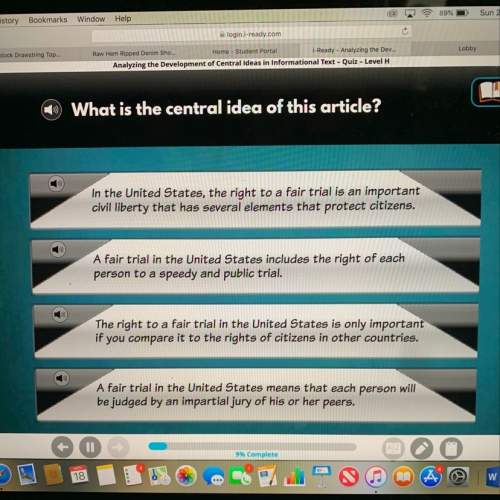
English, 28.03.2021 21:40 hadilalhjajih
Read the excerpt from act 3, scene 2, of Julius Caesar. [BRUTUS.] Hear me for my cause, and be silent, that you may hear. Believe me for mine honour, and have respect to mine honour, that you may believe. Censure me in your wisdom, and awake your senses, that you may the better judge. [ANTONY.] You all did love him once, not without cause: What cause withholds you then to mourn for him? O judgment, thou art fled to brutish beasts, And men have lost their reason! Bear with me. My heart is in the coffin there with Caesar, And I must pause till it come back to me. Which statement best compares the two monologues? Antony speaks without emotion, whereas Brutus speaks with vigor and intensity. Both Brutus and Antony try to appeal to the emotions of the people in the crowd. Brutus appeals to the people’s logic and good sense, whereas Antony appeals to their feelings and emotions. Both Antony and Brutus appeal to the sympathy and sorrow that the crowd feels

Answers: 3


Other questions on the subject: English

English, 22.06.2019 02:30, johnandashley5p65r4a
Which statement best describes the use of the underlined word in the excerpts? in excerpt 1, it refers to personal growth, while in excerpt 2, it suggests the physical act of moving. in excerpt 1, it refers to personal growth, while in excerpt 2, it suggests scientific discoveries. in excerpt 1, it refers to societal advancement, while in excerpt 2, it suggests the gradual march of time. in excerpt 1, it refers to societal advancement, while in excerpt 2, it suggests steps toward a particular goal.
Answers: 2

English, 22.06.2019 03:00, malayalatham3357
Which two parts of this excerpt from mary shelley’s frankenstein reveals information about the setting? (it was on a dreary night of november that i beheld the accomplishment of my toils.) with an anxiety that almost amounted to agony, (i collected the instruments of life around me, that i might infuse a spark of being into the lifeless thing that lay at my feet. it was already one in the morning; the rain pattered dismally against the panes, and my candle was nearly burnt out) when, by the glimmer of the half-extinguished light, i saw the dull yellow eye of the creature open; it breathed hard, and a convulsive motion agitated its limbs. (how can i describe my emotions at this catastrophe), or how delineate the wretch whom with such infinite pains and care i had endeavored to form? his limbs were in proportion, and i had selected his features as beautiful. beautiful! great god! (his yellow skin scarcely covered the work of muscles and arteries beneath; his hair was of a lustrous black, and flowing; his teeth of a pearly whiteness; ) but these luxuriances only formed a more horrid contrast with his watery eyes, that seemed almost of the same color as the dun-white sockets in which they were set, his shriveled complexion and straight black lips.
Answers: 3

English, 22.06.2019 04:20, cooltrey777
With crack on crack of thunder, zeus let fly a bolt against the ship, a direct hit, so that she bucked, in reeking fumes of sulphur, and all the men were flung into the sea. they came up 'round the wreck, bobbing a while like petrels on the waves. no more seafaring homeward for these, no sweet day of return; the god had turned his face from them. –the odyssey, homer read the passage. then, identify the theme that is supported by the passage. most ships cannot survive a terrible thunderstorm. the ocean is an angry beast that will tame any who try to control it. the gods have the power to control human destiny. men are willing to die to eat the delicious cattle of the gods.
Answers: 1

English, 22.06.2019 16:30, ajl05
Sonnets are lyric poems that often contain figurative language. which two parts of shakespeare's sonnet 116 are examples of repetition? sonnet 116 by william shakespeare (let me not to the marriage of true minds admit impediments. love is not love which alters when it alteration finds, or bends with the remover to remove: ) o no; it is an ever-fixed mark, that looks on tempests, and is never shaken; (it is the star to every wandering bark,) whose worth's unknown, although his height be taken. love's not time's fool, though rosy lips and cheeks within his bending sickle's compass come; (love alters not with his brief hours and weeks,) but bears it out even to the edge of doom. (if this be error and upon me proved,) i never writ, nor no man ever loved. everything in quotations are the highlighted sentences, choose from these sentences to answer the question. make sure to choose two answers, you!
Answers: 1
You know the right answer?
Read the excerpt from act 3, scene 2, of Julius Caesar. [BRUTUS.] Hear me for my cause, and be silen...
Questions in other subjects:

English, 10.03.2021 21:40



Mathematics, 10.03.2021 21:40





Mathematics, 10.03.2021 21:40




